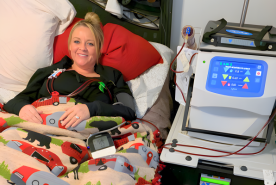Follow these tips to keep your heart healthy on dialysis: control blood sugar and blood pressure, maintain a heart-healthy diet, exercise, treat anemia, and reduce stress.
People with kidney disease or kidney failure are at risk for heart disease. In fact, it is very common. These ten tips can help you lower your risk for getting heart disease —or help keep heart disease from getting worse.
Tip 1: Control Blood Sugar If You Have Diabetes
- Check your blood sugar level as often as your healthcare provider recommends
- Follow your treatment plan of medications, diet, and exercise
- Ask your healthcare provider about which diabetes medications are best for you. Some medicines may be better than others when you are on dialysis
Tip 2: Control High Blood Pressure
- Take all your blood pressure medicines as instructed. Some medicines called angiotensin-converting enzyme inhibitors and angiotensin receptor blockers help to protect your kidneys and heart. Ask your healthcare provider about these if you do not take them now.
- Ask your healthcare team what your blood pressure reading should be. For many people, it should be less than 140/90 before your treatment and less than 130/80 after it.
- Follow your fluid and sodium (salt) limits to keep extra fluid from building up.
- Your diet should not include more than 2000 mg of sodium daily (or 5 grams of salt a day).
- Speak to your dietitian once a month.
- Ask your dialysis care team if the following steps could help prevent fluid buildup:
- Increasing fluid removal during dialysis (called ultrafiltration)
- Longer or more frequent dialysis treatments
Tip 3: Reduce High Cholesterol Levels
- Make sure you have an annual blood test for the following:
- Total cholesterol
- Low-density lipoprotein (LDL) “bad” cholesterol
- High-density lipoprotein (HDL)“good” cholesterol
- Triglycerides
- Ask your healthcare provider what your cholesterol goals should be. If your levels are not in the healthy range, you should:
- Follow a low-fat diet
- Increase physical activity
- Ask about a medicine to help lower cholesterol, if necessary
Tip 4: Follow a Heart-Healthy Diet
- Eat foods low in saturated fats and cholesterol
- Limit high-phosphorus foods like dairy, nuts, seeds, dried beans and peas and dark sodas. (See Heart Tip #7).
- Speak to your dietitian about how to get the right amount of protein and calories to stay at a healthy weight.
- Increase foods that are high in heart healthy omega-3 fatty acids, such as salmon, flaxseeds, soybeans, walnuts and canola oil.
Tip 5: Increase Physical Activity
- Ask your healthcare provider if you need physical therapy first to improve your strength and endurance before increasing physical activity.
- Start exercising slowly and build gradually to about 30 minutes most days of the week.
- Exercise regularly to help:
- Improve unhealthy cholesterol levels
- Reduce excess weight
- Control blood sugar and blood pressure
- Improve heart and lung fitness
Tip 6: Treat Anemia
- Most people with kidney disease or kidney failure will develop anemia
- Anemia means your body does not have enough healthy red blood cells
- Anemia can be treated with drugs called ESAs (erythropoietin-stimulating agents) and extra iron. They help your body make red blood cells.
- Treatment of anemia can help keep heart disease from happening. If you already have heart disease, it can help keep it from getting worse.
- Correcting anemia helps keep the muscle on the left side of the heart from thickening. If this muscle becomes thick, it is harder for the heart to pump blood.
Tip 7: Keep Calcium and Phosphorus in Balance
- Calcium and phosphorus are important nutrients that your body needs. But most people on dialysis develop calcium and phosphorus imbalance. This can lead to bone and heart disease.
- Keep these two important minerals in balance by:
- Following a low-phosphorus diet
- Taking medicines called phosphate binders with your meals and snacks
- Taking an active form of vitamin D if prescribed by your healthcare provider
Tip 10: Reduce Stress
- Stressful feelings like sadness, anger, and worry may contribute to heart disease.
- Your social worker can help you learn how to cope with stressful feelings and should speak with you when you start dialysis and at regular intervals after that.
- Psychological counseling and medications may also be recommended.
















